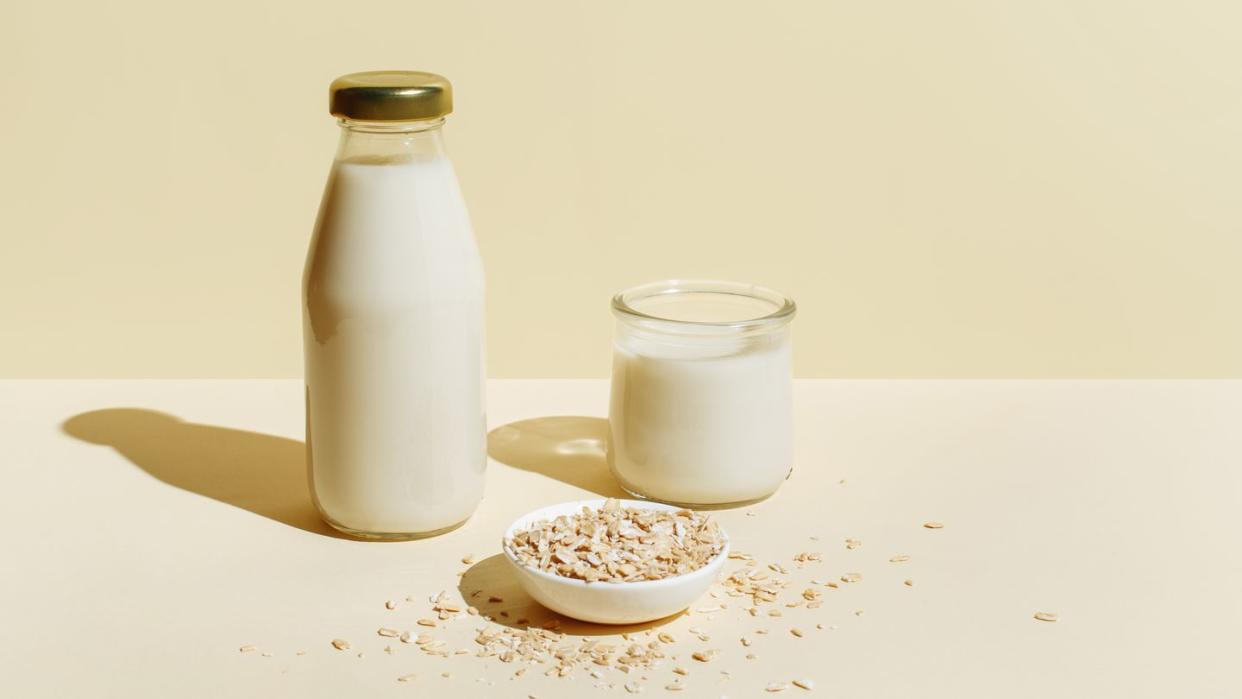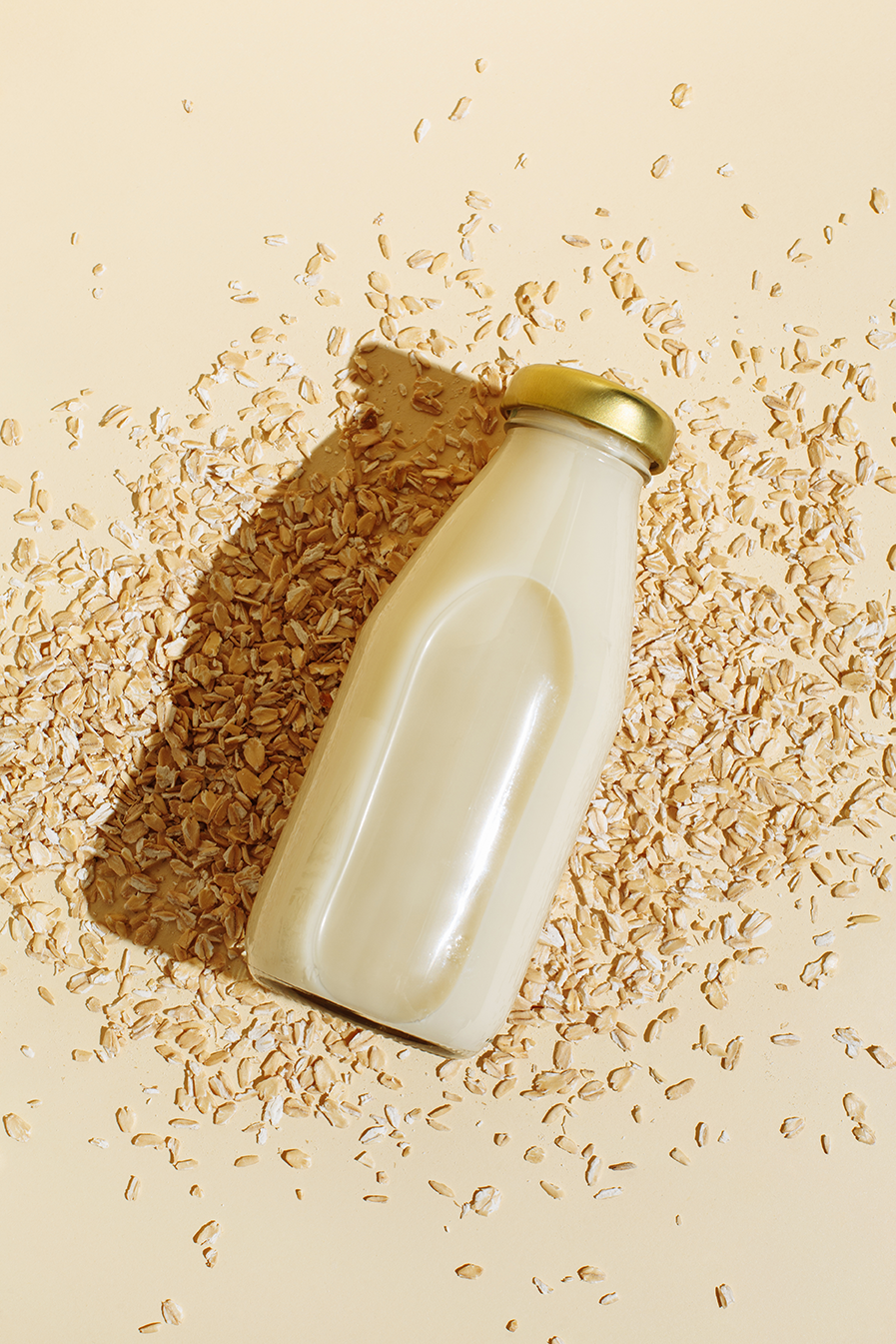Oat Milk Actually Isn't a Scam

"Hearst Magazines and Yahoo may earn commission or revenue on some items through these links."
Go into just about any coffee shop to place your latte order, and you’ll likely have a barista ask what kind of milk you want. Now take a sip of your coffee if you've ever answered with "oat milk." If you put lips to cup, that's not a surprise! The oat milk trend is extending beyond those who are vegan, sensitive to dairy or have other reasons to seek out a plant-based milk, as many see it as a better-for-you option across the board. In fact, oat milk is the second most popular plant milk among consumers, behind almond milk, according to a report from AgFunderNews.com.
However, this fan-favorite dairy alternative has steadily gained a controversial rap due to the ingredients and higher levels of sugar and fat that some brands may contain — despite appearing on the surface as a healthier, more Earth-conscious milk choice. In fact, Dave Asprey, the founder of Bulletproof Coffee, went as far as saying it's "the biggest scam on the planet." But is oat milk's polarizing (and confusing!) reputation deserved? Maybe not.

Let's start with why oat milk is suddenly controversial.
“When it comes to the media hype, oat milk tends to be demonized if it contains other added ingredients, like seed oils and gums, that are used in the processing of the milk to create a product that consumers will want to drink,” explains Liz Shaw, R.D.N., creator of Shaw Simple Swaps.
But as with many packaged foods, not all oat milks are created equal, so the variation in what you see on the label has caused some confusion and earned this plant milk an unwarranted red mark. For instance, you'll find brands with a short ingredient list that simply includes water, oats and salt, and others that are fortified with added nutrients, says Marisa Moore, R.D.N., L.D., a registered dietitian in Atlanta and author of The Plant Love Kitchen. On the flip side, you'll also see longer ingredient lists with additives, added sugar or oils.
We’ve all heard the warning to avoid ingredients that you don't recognize or can't pronounce when choosing packaged foods. This is generally smart advice to keep in mind when you see an ingredient list the length of a CVS receipt. But in terms of unfamiliar or controversial ingredients found on some oat milk labels, Shaw is eager to bust the myth that seed oils should be avoided; this is a misconception commonly touted by social media influencers, many of whom have no official nutrition credentials.
“Consumers often pick up one thing from these wellness influencer accounts and move forward, thinking all seed oils are bad for them, or anything on an ingredient panel they can’t pronounce should be avoided,” she says. “That is certainly not the case – in fact, many seed oils contain polyunsaturated fats that are shown to have health benefits such as supporting your heart.” Sunflower and rapeseed oil, for instance, are present in some oat milk products, and both contain unsaturated fats and other beneficial nutrients.
Additionally, gums, such as gellan gum, are often used in food products to provide texture and bind a product, and there is a lot of speculation on if these are safe — but the FDA has confirmed it is, Shaw says. And added sugar is always something to be mindful of and minimize, but you can get around that by choosing an oat milk without any (such as unsweetened or plain).

Plus, oat milk products in general tend to contain slightly higher amounts of fiber and protein than other plant milks such as almond, for example, due to the base being a whole grain. And fortified oat milk will have nutrients commonly found in cow’s milk, such as calcium, vitamin D and vitamin A.
Although some oat milks may contain a bit more fat than other alternative milks when oil is added to impart that traditional milky creaminess, and flavored and sweetened oat milks frequently contain added sugars, it's important to avoid generalizing, says Moore. “There is no typical amount of sugar or fat that you can expect to find in oat milk, as recipes vary by and within brand.” So it all comes down to choosing the right brand with an ingredient list that fits into your eating style.
You may also be concerned about oat milk’s environmental impact, which ties into human health. The good news is that research suggest that oat milk produces fewer greenhouse gas emissions and has a smaller water footprint when compared to cow's milk.

There's another concern about it spiking blood sugar.
As with all carbohydrate-containing foods, it does elevate blood sugar — but this is a process that's normal and necessary to fuel the body, says Moore, and how worrisome this is comes down to your personal health status (such as if you have a condition like diabetes that requires you to closely monitor blood sugar levels).
“The body breaks down carbohydrates into glucose, which is then used for energy,” Moore explains. “When weighing oat milk's impact on blood sugar, also consider what's being consumed with it. Drinking a fiber-rich smoothie made with oat milk will not spike blood sugar as much as drinking vanilla oat milk by itself, for example.”
The degree to which oat milk may impact your blood sugar is also highly individualized, depending on your biochemistry, Shaw adds.
“For instance, a healthy, active individual without any disease conditions would likely have a 'normal' rise in blood sugar when consuming oat milk,” she says. “However, if the oat milk was sweetened, someone may experience a slightly greater increase in blood sugar. Similarly, if someone with insulin resistance consumed oat milk (with or without added sugars), they too may experience a rise in blood sugars because that's how their body responds to food.”

How to choose an oat milk brand that's right for you.
When shopping for oat milk, Shaw notes that you first want to identify who and what you’ll be using the oat milk for.
“I don’t recommend subbing oat milk for kids, as their nutrient needs for growth are much higher, and they need the protein and calories that cow's milk or a dairy alternative such as soy milk and pea milk will provide,” Shaw says.
Adults who want to jump on the oat milk wagon should search for a brand that is labeled "unsweetened," or is free from or very low in added sugars. If you follow a vegan diet, look for a fortified brand that contains vitamin B12 (found heavily in animal proteins), Shaw recommends.
Another option is to make it yourself in a blender, which is actually quite easy, Moore adds. “Homemade oat milk is less expensive than store-bought, and you get to control what goes into it,” she says.
Bottom line: Oat milk in general isn't something you need to avoid entirely. It all comes down to what ingredients it contains and your lifestyle and personal health status. When in doubt, it's always a good idea to talk to your doctor or a registered dietitian nutritionist about any new dietary changes — they can help you decide which milk option fits best into your eating style, and recommend brands that fit the bill.
You Might Also Like
